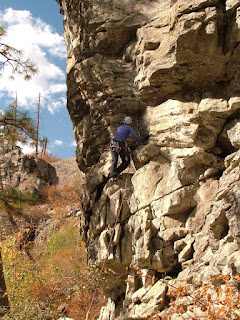We are what we repeatedly do.
Excellence, then, is not an act, but a habit. Aristotle.
Can it be three months since I promised a grand rant on tangents? I guess I drifted off on a series of
tangents, as, looking back at my posts since then, I've posted a
series of short trip reports, and random rants about such topics as
Instagram and the commercialization of the paleo diet among other
things. But then, what should resurrect my interest in tangents but
another blog post crossing one my social media feeds which promised
"tips to get you confident in climbing and back on trad."
Scared spitless
Now, I'm one of those terminally
nervous lead climbers that seems to constantly battle the fear of
falling with resultant death or dismemberment so I clicked on the
link and was instantly disappointed. Here is another one of those
posts that are big on pictures (large pictures too) and short on
information. What information there is, is, once again, largely
tangential to the issue at hand. The first and only useful "tip"
is to start out leading below your grade - although recommending rope
soloing is dubious considering the target audience. Otherwise we are
exhorted to hike, trail run, strength train and do yoga - phew, that
busy schedule will probably leave most folks not only out of time but
out of energy to actually go climbing - and follow a sound
nutritional plan (whatever that is).
Whew, belay stance
Perhaps, if this is an example of the
dominant advice, it is no wonder people spend most of their time
tinkering around the margins instead of tackling their goals head on.
But, for every useless social media article extolling trail running
as a way to train for climbing (for example), there are at least as
many articles that offer much more useful advice, like this one,
which, basically is just another take on "you are what you do."
Easy ground, feels good
I, however, am both a skeptic and a
cynic (also a conspiracy theorist, but that is not relevant here) and
think that the real reason people faff about the edges has more to do
with their stated goals not actually being congruent with their real
goals, than it does about confusion with how to achieve them. In
other words, we are prone to fooling ourselves. We think we want to
achieve something - losing 25 kg, climbing a big wall, sea kayaking
around Australia - it all sounds incredibly badass, legit., or
whatever the latest hipster term is, but really, we don't want that
at all, or at least not enough to work really hard and suffer
deprivation. Fussing about the borders, however, allows us to hold
two disparate beliefs (cognitive dissonance) in our minds at the one
time. We are working towards our goals, all the while not really
wanting to arrive.



No comments:
Post a Comment